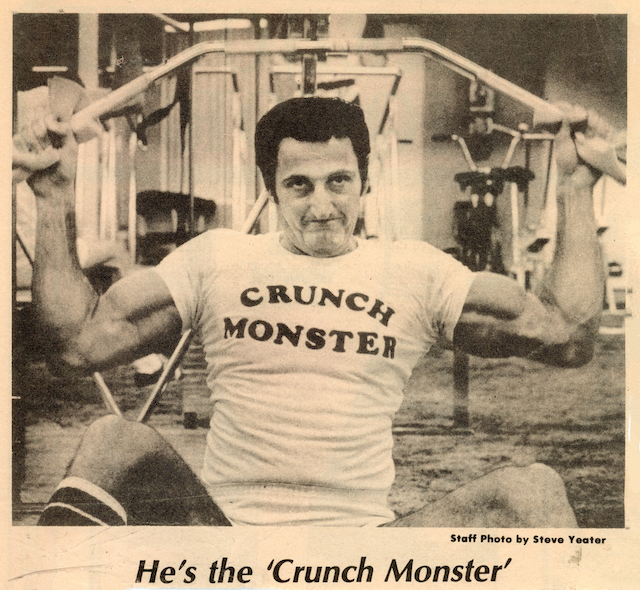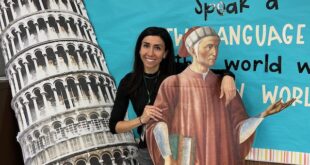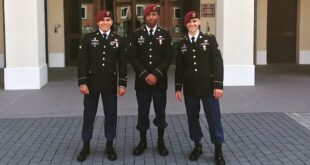Severely wounded by shrapnel during the Vietnam War, Louis Scripa Jr. battled his way back, establishing half a dozen fitness endurance records in as many years.
104,538 jumping jacks in 24 hours.
41,788 leg raises in 12 hours.
110,015 crunches in 17 hours.
133,581 crunches in 30 hours.
160,974 sit-ups in 82 hours.
70,715 sit-ups in 24 hours or less.
If these sound like ridiculous, “there’s no way a person can do that” numbers, think again.
They’re all fitness endurance feats accomplished by Air Force veteran Louis “Lou” Scripa Jr. between 1986 and 1992, and acknowledged by the Guinness World Records.
“I was in great shape, but I was fortunate I had a lot of endurance. I could go for a long time,” Scripa tells Fra Noi. “The main thing was concentrating on not getting cramps. People would throw ice in my mouth to keep me hydrated.”
Scripa’s goal? Not so much the recognition as raising money for charity and good causes.
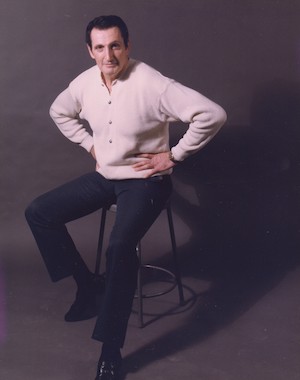 Now 89, Scripa has been battling Parkinson’s disease, and leads a quiet life with his wife, Rose, in their home in suburban Birmingham, Alabama.
Now 89, Scripa has been battling Parkinson’s disease, and leads a quiet life with his wife, Rose, in their home in suburban Birmingham, Alabama.
He joined the ranks of the National Italian American Sports Hall of Fame last year, but was unable to attend the induction ceremony. Instead, NIASHF President Ron Onesti flew to Alabama to induct him in person, capturing the moment on videotape and airing it at the December gala.
“Thank you for what you’ve done,” Onesti told Scripa after presenting Scripa with his award, “not only for sports but (for what) you’ve done to perpetuate your heritage and your culture, and be a proud role model for the youth of today.”
Born Louis Sghirripa — his father changed his name to make it easier to pronounce while doing business — Scripa was the youngest of 12 children in an Italian immigrant family in Schenectady, New York. His father owned several businesses over the years, including a photography studio, a grocery/soda shop, and an Italian restaurant and bar.
“We all grew up being proud of our great Italian heritage, developing a deep appreciation for the importance of faith, family, country, hard work and being proud to be a part of two great civilizations,” Scripa said when he accepted the award.
As a young boy, he helped the family financially by shining shoes and selling candy bars. He also helped do dishes and clean — his least favorite being handling spittoons — at the family’s restaurant, where his mother did the cooking.
With a natural talent for athletics, Scripa played football and ran track and cross-country in high school. He was offered a football scholarship by the University of Oklahoma but instead enlisted in the U.S. Air Force in 1953. That led to a 23-year career as a military paramedic and a member of rescue and recovery squadrons and other medical units. He served in Korea and Vietnam, where he did three combat tours, and had multiple assignments throughout the world, including in Germany, Turkey and Italy.
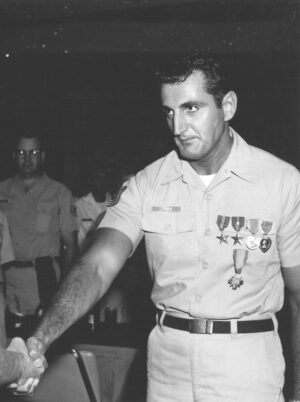 Scripa earned numerous medals, decorations and commendations over the years, including the Silver Star Medal for gallantry, Purple Heart, Meritorious Service Medal, Air Force Commendation Medal and many more.
Scripa earned numerous medals, decorations and commendations over the years, including the Silver Star Medal for gallantry, Purple Heart, Meritorious Service Medal, Air Force Commendation Medal and many more.
In 1955, Scripa was selected to lead a team tasked with opening a military hospital at Aviano Air Base in Aviano, Italy, an assignment that required having the appropriate medical skills, high moral standards and the ability to speak Italian. Sixty-four years later, in 2019, Scripa was invited to return to Aviano, where he was presented the Return with Honor medal by the medical center’s commander.
Throughout his military career, Scripa took every opportunity offered by the military to participate and compete in sports, including jiu-jitsu, judo, karate, boxing and soccer. In 1955 he attended a judo-instructor training program at Ramstein Air Base in Germany, and five years later he was sent on a six-month temporary duty to take advanced judo training at the prestigious Kodokan Judo Institute in Tokyo.
His martial arts accomplishments include earning a 5th Degree black belt in Japanese-style jiu-jitsu, and black belts in judo and karate.
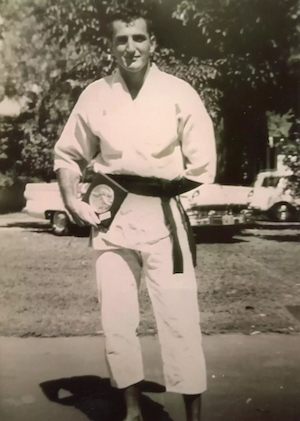 He also was a martial arts instructor in various military settings, such as when he taught combative measures to Turkish military members in Ankara, Turkey, and to Chinese military members in modern-day Taiwan. He also taught self-defense to nurses in Vietnam.
He also was a martial arts instructor in various military settings, such as when he taught combative measures to Turkish military members in Ankara, Turkey, and to Chinese military members in modern-day Taiwan. He also taught self-defense to nurses in Vietnam.
A major turning point in Scripa’s life came in 1968, when he was hit by shrapnel while trying to rescue a wounded individual during an attack on base in Vietnam.
During his recovery, he went from 220 pounds to 160 pounds. His injuries confined him to a desk job, and he was given strict orders to limit his physical activity and not lift anything over 10 pounds.
When his enlistment was up in 1976, Scripa chose to retire.
That’s also when his inner athlete came roaring back, sparking a staunch determination to “rebuild” himself. Scripa devised his own workout routine and began training at the Jack LaLanne health club in Sacramento, California.
He also began to apply for jobs, a major challenge for someone with a disability in those days. He ended up taking a job as a janitor at Aerojet aerospace corporation, whose manufacturing director he’d met at the health club. He started moving up the ladder within a month, and 24 years later he retired as a manager.
The company allowed time for Scripa to continue his rehabilitation at the health club, whose owner, Joe Baratta, let him use the facility early in the morning and late at night, and eventually introduced him to LaLanne.
“He was very outgoing. A super salesman, with a very good sense of humor and witty,” Scripa recalls of LaLanne. “He’d talk about most anything, but he was always on stage.”
Scripa trained assiduously for about four years and fully rebuilt his strength and endurance.
In 1980, the Italian Cultural Society of Sacramento contacted him about joining the organization, which was fundraising to benefit people affected by Cooley’s anemia, or beta thalassemia major. The blood disorder affects about 68,000 children born each year, mostly in the Mediterranean, Middle East, southern China, and Southeast and South Asia, according to the National Institutes of Health.
Scripa decided he wanted to help raise funds for the cause, so he asked the dietitian at the Jack LaLanne health club for ideas. The dietitian suggested he raise money by doing sit-ups and abdominal crunches.
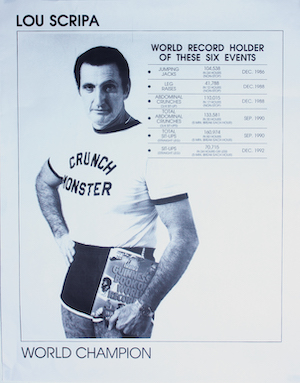 That was the spark that led Scripa to perform multiple fitness endurance events, resulting in six world records while fundraising for multiple individuals and organizations. He also took part in numerous Ironman events.
That was the spark that led Scripa to perform multiple fitness endurance events, resulting in six world records while fundraising for multiple individuals and organizations. He also took part in numerous Ironman events.
“I repeatedly broke myself over and over again,” Scripa says of his records. “The most significant was the sit-ups. I had to go back to the Guinness people to find out what way I had to do them. They said on a flat floor, with hands clasped behind my head, straight legged, and alternating elbows to knees. I had to do that with no one holding me.”
All endurance records allow for a five-minute break every hour, with the option of “banking” breaks and taking, say, a 15-minute break after three hours, explains Scripa, who earned the nickname “The Crunch Monster.”
The most difficult record was the jumping jacks, he says. “Jumping up and down, and trying to maintain that for 24 hours … It was very grueling.”
Scripa raised funds through his fitness and Ironman feats as people pledged a set amount of money, or a dollar amount for each abdominal crunch, sit-up, leg raise or jumping jack.
According to research done by Scripa’s wife and friends, who nominated him for NIASHF induction, Scripa helped raise more than $8 million for multiple charities and causes, including the American Cancer Society, American Heart Association, California Vietnam Veterans Memorial, cerebral palsy, Sacramento Make-A-Wish® Foundation, Salvation Army, Special Olympics, United Negro College Fund and WEAVE (Women Escaping a Violent Environment), among many others.
He also performed feats for specific individuals. For example, in 1981 he did 16,023 crunches in 2 hours and 43 minutes, breaking his previous world record by 6,000, in honor of his co-worker’s son, 16-year-old Bruce Sullivan, who had cancer and whose mother had died in a car crash. Young Bruce asked that the money raised be used to equip a pediatric playroom at the University of California San Francisco Medical Center.
“It was never about records,” Scripa said in his NIASHF speech. “It was more about community service and lending a helping hand to those who are struggling to make it to the top of a steep hill. With everyone giving a helping hand, those struggling can make it all the way to the top.”
Scripa said he’s also proud of having given many talks to students from elementary to high school about the importance of staying healthy and eating nutritious food, as well as helping procure Christmas gifts for children in foster care and orphanages.
So how did he do it all? “He’s very driven,” says his wife, Rose, who met him after he set his world records. “If he sets his mind to something, he’s going to accomplish it.”
And yet — contrary to what one might imagine — Scripa has an easy-going personality, his wife says. “He makes friends easily; our friends just love him to death. He gets along with everybody, and he’s very giving.”
2024 is a big year for Scripa, who will celebrate his 30th wedding anniversary in August and will turn 90 in December. He has three children, seven grandchildren (one passed away) and two great-grandchildren.
At last year’s NIASHF induction ceremony, his son Tony Scripa spoke of his father’s “extraordinary legacy.”
“A lot of times, people have a drive to do something, and my father had this drive to do everything,” Tony Scripa said. “It wasn’t just about getting the thing done. It was about what happened after that.”
The above appears in the May 2024 issue of the print version of Fra Noi. Our gorgeous, monthly magazine contains a veritable feast of news and views, profiles and features, entertainment and culture. To subscribe, click here.
 Fra Noi Embrace Your Inner Italian
Fra Noi Embrace Your Inner Italian


